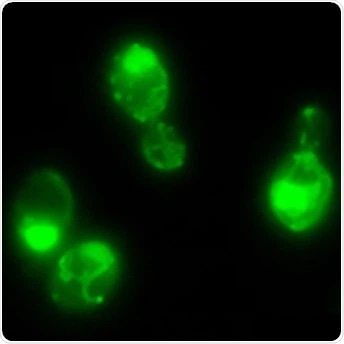Prions are proteins found in the brain and familiar for their role in causing disease. However, a new study published recently in eLife indicates they may support yeast in coping with quickly changing environmental conditions.

Yeast cells containing the prion form of the Pus4 protein, which is shown in green. Image Credit: Garcia, Campbell, et al.
The study results demonstrate that prions could have a role in a major epigenetic mechanism for regulating cell growth under changing conditions. A better understanding of this role could improve the understanding of diseases presenting abnormal cell growth or cell death.
Prions are proteins folded abnormally into various shapes. They can be passed on to new cells or spread. They have notably been associated with two deadly brain diseases—Creutzfeldt-Jakob and Mad Cow disease. However, some prions could be useful. Prions of different shapes may have a different task in the cell, like a Swiss Army knife.
While scientists have known about prions for decades, we don’t yet know what distinguishes beneficial prions from harmful ones.”
David Garcia, PhD, Study Co-First Author and Assistant Professor, Institute of Molecular Biology, University of Oregon
Garcia was previously a postdoctoral fellow at the Department of Chemical Systems Biology at Stanford University School of Medicine, California.
To gain further insights, Garcia and his team analyzed a yeast enzyme known as pseudouridine synthase that can assume two different shapes. They discovered that, in its alter-ego prion form, the enzyme makes yeast multiply and proliferate very rapidly, though these changes reduce the lifespan of the yeast.
The researchers used computer modeling to show that the changes brought about by the prion are advantageous when environmental resources are copious but deleterious when resources are scarce.
They reduced what is called a protein “chaperone,” demonstrating that the prion can revert to its original enzyme shape. Protein chaperones fluctuate themselves under changing conditions; therefore, the researchers postulate that this could be a way to turn the prion on or off when it is required.
We’ve identified a new role for prions in which they can transform cell growth and survival. These findings suggest that prions may be another form of epigenetic control of cells.”
Edgar Campbell, Study Co-First Author and PhD Student, Chemical and Systems Biology, Stanford Medicine
Due to epigenetic changes, the behavior of cells could change without any change in their DNA. The behavior can even be passed on to new generations of cells and may be turned on or off by environmental conditions. The researchers note that gaining more insights into the role of prions in epigenetic control may be crucial for achieving a better understanding of prion diseases.
These types of epigenetic changes are missed when we sequence genomes but can still have a major influence on cell growth. It is critical to learn more about the consequences of prion-driven epigenetic changes in cells and find new ways to search for them in yeast and other organisms.”
Daniel Jarosz, PhD, Study Senior Author and Associate Professor of Chemical and Systems Biology and Developmental Biology, Stanford Medicine
Source:
Journal reference:
Garcia, D. M., et al. (2021) A prion accelerates proliferation at the expense of lifespan. eLife. doi.org/10.7554/eLife.60917.